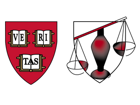Posts filed under 'Politics'
University: Knowledge Beyond Authority
Internet & Society Conference 2007
Lead Up Event

 Download the audio podcast (time: 1:14:10).
Download the audio podcast (time: 1:14:10).
The role and mission of libraries is to collect, organise, preserve and make available the world’s cultural and scientific heritage for current and future generations. Publicly funded libraries operating for the public benefit support access to knowledge, as well as education and training, critical to developing nations whose human resource is central to their advancement. Digital technologies are transforming the way that libraries work. What new opportunities are being created? What challenges do we face and how is eIFL.net addressing them?
Teresa Hackett runs eIFL-IP “Advocacy for Access to Knowledge: copyright & libraries”, a programme to raise awareness in copyright issues for libraries in 50 developing and transition countries. The goal is to build capacity and expertise amongst the eIFL.net library community and to represent the interests of members in key international policy fora such as WIPO, UNESCO and the WTO. Previously, Teresa was the Director of the European library association (EBLIDA), provided technical support to the European Commission library research programme and was part of the team to establish electronic information centres at the British Council Germany. Teresa is currently an Expert Resource Person on the Copyright and Other Legal Matters Committee of the International Federation of Library Associations and Institutions (IFLA-CLM). She is a chartered librarian and in 2004 completed a post-graduate diploma in legal studies at the Dublin Institute of Technology.
May 2nd, 2007
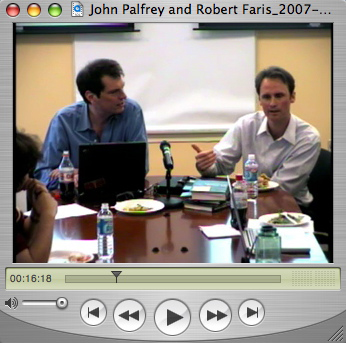
Click To Play Video
Rob Faris, the OpenNet Initiative‘s Research Director and John Palfrey, one of the project’s Principal Investigators, lead a discussion of Internet filtering and provided a glimpse of the results of ONI’s first global survey of Internet censorship.
In the last year ONI has studied forty countries and found a substantial increase in Internet censorship, colored by complex and dynamic political, legal and social processes. The research will be documented in the forthcoming MIT Press book: Access Denied: the Practice and Policy of Global Internet Filtering.
The OpenNet Initiative is a partnership between the Citizen Lab at the Munk Centre for International Studies, University of Toronto, the Berkman Center for Internet & Society at Harvard Law School, the Advanced Network Research Group at the Cambridge Security Programme at Cambridge University, and the Oxford Internet Institute at the University of Oxford.
Runtime: 1:08:57, size: 320×240, 188mb, QuickTime .MOV, H.264 codec
May 2nd, 2007
 Rob Faris, the OpenNet Initiative‘s Research Director and John Palfrey, one of the project’s Principal Investigators, lead a discussion of Internet filtering and provided a glimpse of the results of ONI’s first global survey of Internet censorship.
Rob Faris, the OpenNet Initiative‘s Research Director and John Palfrey, one of the project’s Principal Investigators, lead a discussion of Internet filtering and provided a glimpse of the results of ONI’s first global survey of Internet censorship.
 Download the audio podcast (time: 1:08:57).
Download the audio podcast (time: 1:08:57).
In the last year ONI has studied forty countries and found a substantial increase in Internet censorship, colored by complex and dynamic political, legal and social processes. The research will be documented in the forthcoming MIT Press book: Access Denied: the Practice and Policy of Global Internet Filtering.
The OpenNet Initiative is a partnership between the Citizen Lab at the Munk Centre for International Studies, University of Toronto, the Berkman Center for Internet & Society at Harvard Law School, the Advanced Network Research Group at the Cambridge Security Programme at Cambridge University, and the Oxford Internet Institute at the University of Oxford.
April 26th, 2007
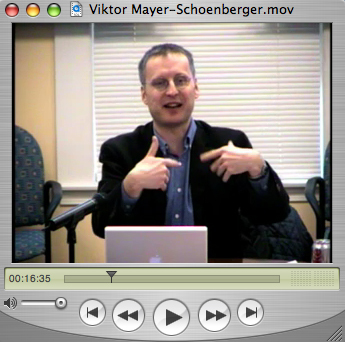
Click To Play Video
Viktor Mayer-Schoenberger discusses “Napster’s Second Life? Regulatory Dynamics of Virtual Worlds”.
Five million registered users and counting – Second Life is the current darling of the media. With its decision to let users build their virtual world and retain intellectual property rights in their creations they broke new ground, then they opens-sourced their client software. Soon we may see multiple Second Life-like virtual worlds competing against each other – on what? Should lawmakers care? Should we care?
Runtime: 1:15:10, size: 320×240, 175mb, QuickTime .MOV, H.264 codec
April 4th, 2007
 Viktor Mayer-Schoenberger discusses “Napster’s Second Life? Regulatory Dynamics of Virtual Worlds”.
Viktor Mayer-Schoenberger discusses “Napster’s Second Life? Regulatory Dynamics of Virtual Worlds”.
 Download the audio podcast (time: 1:15:10).
Download the audio podcast (time: 1:15:10).
Five million registered users and counting – Second Life is the current darling of the media. With its decision to let users build their virtual world and retain intellectual property rights in their creations they broke new ground, then they opens-sourced their client software. Soon we may see multiple Second Life-like virtual worlds competing against each other – on what? Should lawmakers care? Should we care?
April 3rd, 2007
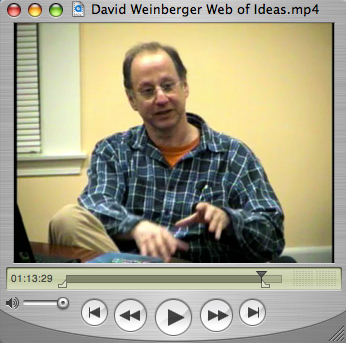
Click To Play Video
Web of Ideas with David Weinberger, March 21, 2007.
Thanks to the pliability of bits and the connectedness of the Net, we’re now able to participate in our culture like never before. We can create a video and post it at sites like YouTube. We can watch a video and comment on it, tag it, link to it, mash it up with another video. We can build massive encyclopedias together. We can form clans to play games. We can build an island in SecondLife where we can interact in a world we’ve created together. But, is this burst of participation in culture leading to greater participation in politics and democracy? If so, what are the connecting points?
This video features David Weinberger leading a Web of Ideas discussion at the Berkman Center to explore these and other questions.
Runtime: 1:20:56, size: 320×240, 225mb, QuickTime .MP4, H.264 codec
March 28th, 2007
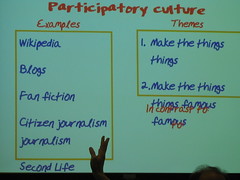
Web of Ideas with David Weinberger, March 21, 2007.
 Download the audio podcast (time: 1:20:56).
Download the audio podcast (time: 1:20:56).
Thanks to the pliability of bits and the connectedness of the Net, we’re now able to participate in our culture like never before. We can create a video and post it at sites like YouTube. We can watch a video and comment on it, tag it, link to it, mash it up with another video. We can build massive encyclopedias together. We can form clans to play games. We can build an island in SecondLife where we can interact in a world we’ve created together. But, is this burst of participation in culture leading to greater participation in politics and democracy? If so, what are the connecting points?
On this edition of AudioBerkman, we’ll hear David Weinberger leading a Web of Ideas discussion at the Berkman Center to explore these and other questions.
March 26th, 2007
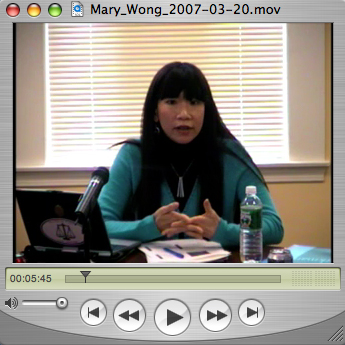
Click To Play Video
Mary Wong of Franklin Pierce Law Center joins Berkman Center guests, fellows, and staff to discuss the growing discourse around such topics as “the commons,” “free culture,” and “open content.”
Professor Wong addresses the extent to which these terms are rhetoric or signals of change; how “openness” can be stunted by lack of clarity in copyright standards; and what the future may hold in light of technological advancements.
Runtime: 1:03:04, size: 320×240, 183mb, QuickTime .mov, H.264 codec
March 21st, 2007
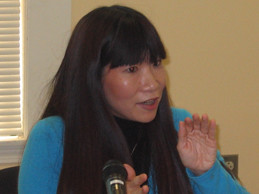
Mary Wong of Franklin Pierce Law Center joins Berkman Center guests, fellows, and staff to discuss the growing discourse around such topics as “the commons,” “free culture,” and “open content.”
 Download the audio podcast (time: 1:03:04).
Download the audio podcast (time: 1:03:04).
Professor Wong addresses the extent to which these terms are rhetoric or signals of change; how “openness” can be stunted by lack of clarity in copyright standards; and what the future may hold in light of technological advancements.
March 20th, 2007
 On March 14, 2007, the Berkman Center Clinical Program in Cyberlaw and Harvard Law School’s Office of Public Interest Advising’s Heyman Fellowship Program sponsored a panel discussion on the controversy surrounding the Bush administration’s firing of eight United States Attorneys.
On March 14, 2007, the Berkman Center Clinical Program in Cyberlaw and Harvard Law School’s Office of Public Interest Advising’s Heyman Fellowship Program sponsored a panel discussion on the controversy surrounding the Bush administration’s firing of eight United States Attorneys.
 Download the audio podcast (time: 1:21:34).
Download the audio podcast (time: 1:21:34).
Panelists include: Professor David Barron of Harvard Law School; Ari Shapiro, Justice Reporter, Washington Desk, National Public Radio; Stuart Gerson, former Acting Attorney General and former Assistant Attorney General, Civil Division, DOJ; Bud Cummins, former US Attorney for the Eastern District of Arkansas (2001-2006), and Elliot Mincberg, Chief Counsel for Oversight and Investigations, House Judiciary Committee.
The discussion was moderated by James Flug, Senior Heyman Fellow in Residence and Covington & Burling Distinguished Visitor and Lecturer on Law, Harvard Law School.
More information on the presentation and considerable background on the controversy surrounding the firings can be found on the event wiki.
March 17th, 2007
Next Posts
Previous Posts
 Download the audio podcast (time: 1:14:10).
Download the audio podcast (time: 1:14:10).

 Rob Faris
Rob Faris





 On March 14, 2007, the Berkman Center
On March 14, 2007, the Berkman Center 